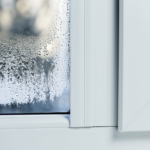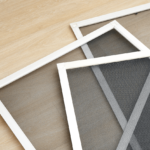Condensation on Your Windows? Where it comes from & how to reduce it.
When cold weather rolls in and the heat kicks on, you may notice fog building on your windows or glass doors. Periodic condensation on your windows is normal, a sign of too much humidity in the air. However, if you notice mildew forming on your walls or ceiling, peeling paint, or a heavy amount of moisture on your windows, it’s time to reduce the humidity inside your home.
Condensation happens when water vapor becomes liquid, like when a glass of ice water “sweats” because the water vapor in the air meets the cold surface of the glass and forms water droplets. Condensation occurs either when the air temperature drops to its dew point – picture a dewy meadow in the early morning – or the air becomes so saturated with moisture that it cannot hold any more water, as in a rainstorm, condensing into drops of water.
The same is true inside your home. All air retains moisture or humidity, and in a home, humidity can come from your HVAC, humidifier, bathroom, cooking, diffuser, or any activity that adds moisture to the air. In the summer, materials such as wood or plaster absorb excess moisture only to release it as temperatures fall and the heat switches on. Winter is usually the season when condensation, and its culprit high humidity, becomes apparent.
We see condensation on windows, glass, and mirrors because moisture cannot penetrate through the surface as it does with wood and many other building materials. Modern double and triple pane windows (like the Revelation Elite Series from LEI) are designed with advanced insulating chambers and moisture barriers that effectively seal in warm air and keep out the cold. Because of these energy-efficient technologies, windows are excellent at trapping heat indoors, decreasing areas for humidity to escape, and producing condensation. Fog on the surface of a window is a sign that the air in your home is too humid.
Reduce Humidity, Reduce Condensation
Condensation is generally not a cause for alarm; it means your windows are working, and your home is air-tight. But if you wish to reduce the levels of condensation you see, removing excess humidity is the best way.
- Use exhaust fans/vents anytime you engage in an activity that produces steam, including showering, cooking, washing dishes, etc. Exhaust fans remove excess moisture and can improve overall air quality. Ideally, vent heat sources to the outside to prevent moisture build-up.
- Change your thermostat’s humidity settings. Your thermostat regulates temperature but can also help control indoor humidity. While everyone’s home and comfort levels are different, a humidity setting between 30% and 40% is typically ideal in winter and should be set slightly higher in the summer. Understanding and managing your thermostat’s settings will help you reduce condensation and enjoy a more comfortable home year-round.
- Keep gable vents and louvers in your attic open to allow humidity to escape. Even in winter, gable vents help circulate air, keeping temperatures stable and drying out the attic space to thwart mold and mildew growth.
- Fresh airflow helps get rid of stale muggy air – and generally improves air quality – so open a few windows and doors once in a while. Not only will airing out your home remove condensation, but it also eliminates any odors, allergens, or dust.
- Be mindful that house plants can increase humidity. House plants have numerous emotional and health benefits in a home, from oxygenating the air to reducing stress. They look beautiful and bring nature indoors, but they can also increase humidity. So if condensation is a concern, the number of plants you have is something to keep in mind before you go full urban jungle.
Being at home is all about feeling comfortable and safe. Try these tips to improve the comfort of your home and when it’s time for an upgrade to your windows or doors, contact the team at LEI for a free consultation.







